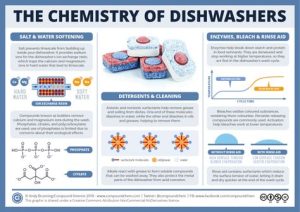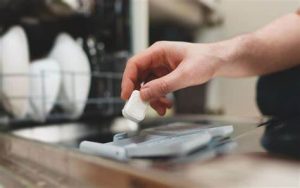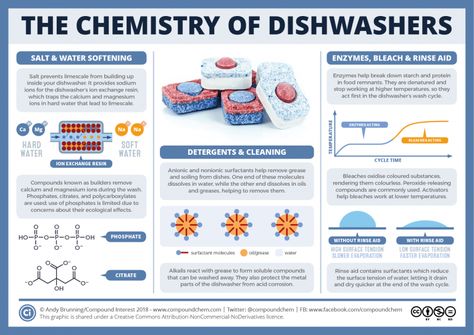Dishwasher tablets have become a household staple, primarily known for their role in cleaning dishes, but their effectiveness extends far beyond the kitchen sink. Have you ever wondered what makes dishwasher tablets so powerful in tackling tough stains and messes? It all comes down to the science behind these compact cleaning wonders. In this article, we’ll delve into the scientific principles that underlie the exceptional cleaning power of dishwasher tablets and explore the chemistry that makes them so effective.
The Core Ingredients: A Chemical Symphony
Dishwasher tablets are essentially a cocktail of various chemicals carefully formulated to target different types of stains and grime. Understanding the key ingredients and their functions is the first step in unraveling the science of clean:
1. Enzymes: The Stain Assassins
Enzymes are biological molecules that act as catalysts, speeding up chemical reactions. In dishwasher tablets, enzymes play a pivotal role. They break down complex molecules found in stains like proteins (from food residues) and starches (from pasta, rice, and potatoes). There are different enzymes, each designed to tackle specific types of stains.
2. Surfactants: The Grease Fighters
Surfactants, short for “surface-active agents,” are molecules that reduce the surface tension of water, allowing it to spread and penetrate more effectively. Surfactants in dishwasher tablets help to lift and remove dirt, grime, and food particles from the surfaces they come into contact with.

3. Bleaching Agents: Brightening the Scene
Oxygen bleach, typically in the form of sodium percarbonate or sodium perborate, is a key ingredient in dishwasher tablets. When dissolved in water, oxygen bleach releases oxygen ions, which break down and disintegrate stains. It’s particularly effective against organic stains, like those from coffee and red wine.
4. Alkaline Agents: Battling Hard Water
Hard water, which contains minerals like calcium and magnesium, can leave mineral deposits on dishes and glassware. Dishwasher tablets contain alkaline agents, like sodium carbonate, which help soften hard water by binding to these minerals, preventing them from forming scale on your dishes.
5. Phosphates: The Water Softeners
Phosphates are excellent water softeners, which means they help to reduce the negative effects of hard water. They prevent limescale buildup, ensuring that your glassware remains crystal clear and your dishes spotless.
6. Solvents: Dissolving the Grease
Some dishwasher tablets include solvents to help dissolve and remove stubborn grease and oil stains. These solvents are particularly useful in removing baked-on and caked-on residues.
The Chemistry in Action: How Dishwasher Tablets Work
Now that we understand the core ingredients, let’s look at the science behind the cleaning process:
- Stain Detection: When you load your dishwasher and insert a tablet, it dissolves in the water during the wash cycle. As the dishwasher sprays water onto your dishes, the enzymes in the tablet detect and attach themselves to stains.
- Chemical Reactions: Once attached to the stains, the enzymes catalyze chemical reactions that break down complex molecules into simpler, water-soluble compounds. For instance, protease enzymes break down proteins into amino acids, while amylase enzymes target starches.
- Emulsification: Surfactants in the tablet help emulsify fats and oils, allowing them to mix with water and be rinsed away effectively. This is especially crucial for cutting through greasy residues.
- Oxygen Bleach: When oxygen bleach is released, it attacks organic stains by oxidizing them. The oxygen ions break down the chemical bonds in the stains, making them easier to wash away.
- Alkaline Action: Alkaline agents in the tablet prevent limescale buildup and also help in removing mineral deposits, ensuring that glassware remains spot-free.
Beyond the Kitchen: Versatility and Eco-Friendliness
One of the remarkable features of dishwasher tablets is their versatility. While they were initially designed for dishwashing, they have found applications beyond the kitchen. From bathroom cleaning to outdoor tasks, dishwasher tablets have proven effective in various cleaning scenarios. However, it’s important to choose eco-friendly dishwasher tablets that are biodegradable and safe for the environment to ensure that your cleaning practices are sustainable.

In Conclusion
Dishwasher tablets are a testament to the power of chemistry harnessed for household cleaning. The combination of enzymes, surfactants, oxygen bleach, and other key ingredients transforms them into effective stain-busting agents. Understanding the science behind dishwasher tablets can help you appreciate their cleaning power and make informed choices when it comes to household cleaning. So, the next time you pop a dishwasher tablet into your machine, you’ll know that it’s not just cleaning – it’s science in action, making your world a cleaner and brighter place.










